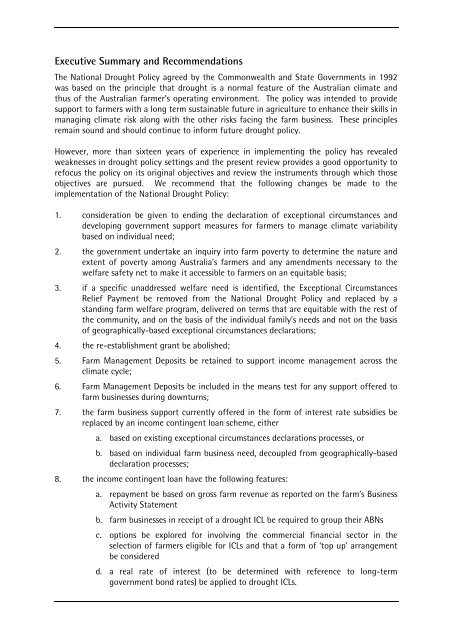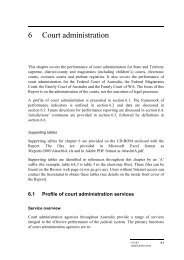Dr Linda Botterill and Professor Bruce Chapman (PDF - 74 Kb)
Dr Linda Botterill and Professor Bruce Chapman (PDF - 74 Kb)
Dr Linda Botterill and Professor Bruce Chapman (PDF - 74 Kb)
Create successful ePaper yourself
Turn your PDF publications into a flip-book with our unique Google optimized e-Paper software.
Executive Summary <strong>and</strong> Recommendations<br />
The National <strong>Dr</strong>ought Policy agreed by the Commonwealth <strong>and</strong> State Governments in 1992<br />
was based on the principle that drought is a normal feature of the Australian climate <strong>and</strong><br />
thus of the Australian farmer’s operating environment. The policy was intended to provide<br />
support to farmers with a long term sustainable future in agriculture to enhance their skills in<br />
managing climate risk along with the other risks facing the farm business. These principles<br />
remain sound <strong>and</strong> should continue to inform future drought policy.<br />
However, more than sixteen years of experience in implementing the policy has revealed<br />
weaknesses in drought policy settings <strong>and</strong> the present review provides a good opportunity to<br />
refocus the policy on its original objectives <strong>and</strong> review the instruments through which those<br />
objectives are pursued. We recommend that the following changes be made to the<br />
implementation of the National <strong>Dr</strong>ought Policy:<br />
1. consideration be given to ending the declaration of exceptional circumstances <strong>and</strong><br />
developing government support measures for farmers to manage climate variability<br />
based on individual need;<br />
2. the government undertake an inquiry into farm poverty to determine the nature <strong>and</strong><br />
extent of poverty among Australia’s farmers <strong>and</strong> any amendments necessary to the<br />
welfare safety net to make it accessible to farmers on an equitable basis;<br />
3. if a specific unaddressed welfare need is identified, the Exceptional Circumstances<br />
Relief Payment be removed from the National <strong>Dr</strong>ought Policy <strong>and</strong> replaced by a<br />
st<strong>and</strong>ing farm welfare program, delivered on terms that are equitable with the rest of<br />
the community, <strong>and</strong> on the basis of the individual family’s needs <strong>and</strong> not on the basis<br />
of geographically-based exceptional circumstances declarations;<br />
4. the re-establishment grant be abolished;<br />
5. Farm Management Deposits be retained to support income management across the<br />
climate cycle;<br />
6. Farm Management Deposits be included in the means test for any support offered to<br />
farm businesses during downturns;<br />
7. the farm business support currently offered in the form of interest rate subsidies be<br />
replaced by an income contingent loan scheme, either<br />
a. based on existing exceptional circumstances declarations processes, or<br />
b. based on individual farm business need, decoupled from geographically-based<br />
declaration processes;<br />
8. the income contingent loan have the following features:<br />
a. repayment be based on gross farm revenue as reported on the farm’s Business<br />
Activity Statement<br />
b. farm businesses in receipt of a drought ICL be required to group their ABNs<br />
c. options be explored for involving the commercial financial sector in the<br />
selection of farmers eligible for ICLs <strong>and</strong> that a form of ‘top up’ arrangement<br />
be considered<br />
d. a real rate of interest (to be determined with reference to long-term<br />
government bond rates) be applied to drought ICLs.
















